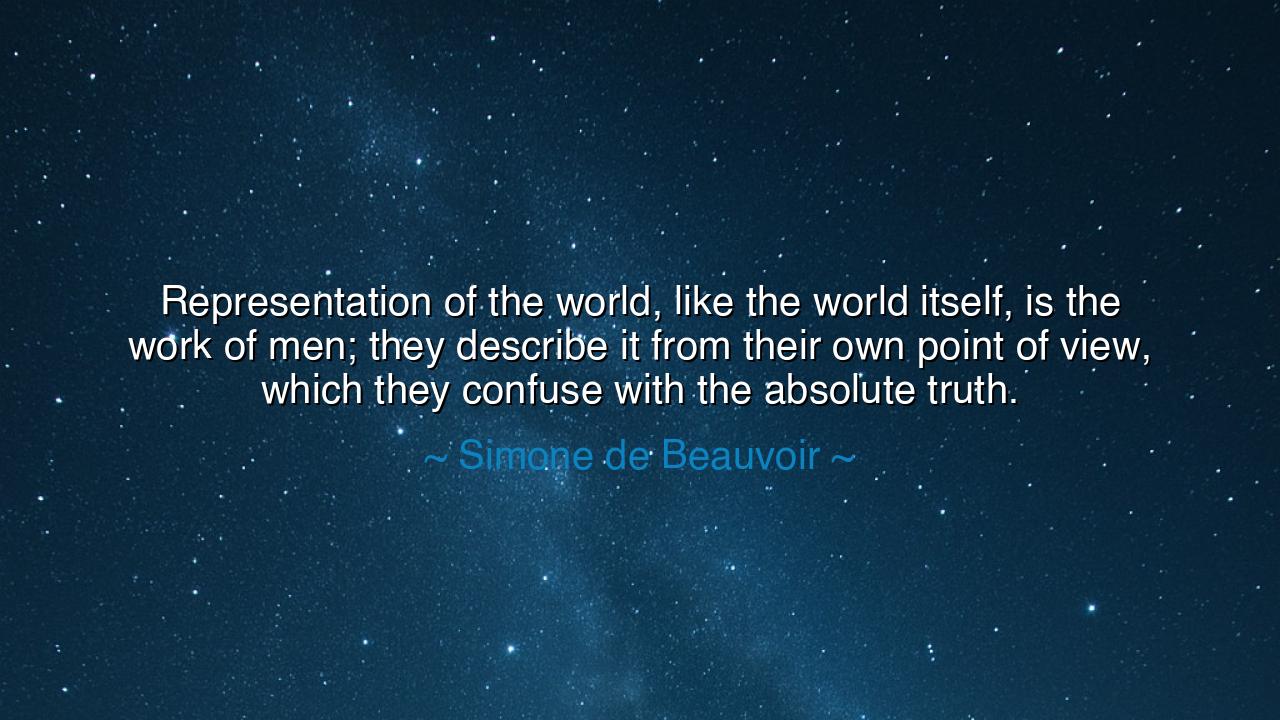
Representation of the world, like the world itself, is the work
Representation of the world, like the world itself, is the work of men; they describe it from their own point of view, which they confuse with the absolute truth.






Hear the words of Simone de Beauvoir, seer of truth and liberator of voices, who declared: “Representation of the world, like the world itself, is the work of men; they describe it from their own point of view, which they confuse with the absolute truth.” This saying strikes at the heart of history, for it unveils the silent power of perspective—the truth that what is called “the world” is often but a mirror of those who hold the pen, the throne, or the pulpit. The rulers of thought, the keepers of knowledge, have long written their visions as if they were eternal law, forgetting that their view is not the whole of reality, but only one narrow beam of it.
The origin of this wisdom lies in centuries where men, quite literally, were the authors of the world. In chronicles and scriptures, in philosophies and laws, the voices of women, the poor, and the oppressed were silenced or diminished. Thus the representation of the world was shaped through the eyes of the powerful few. They mistook their angle for the absolute truth, teaching generations to believe that what was partial was whole, what was biased was universal. De Beauvoir, with clarity and fire, shattered this illusion, reminding us that the “truth” of the world must always be questioned: whose truth is it? Whose voice is missing?
Consider the tale of Herodotus, often called the father of history. He wrote of wars between Greeks and Persians, of victories and defeats, of cultures strange and familiar. Yet his histories were written from the vantage of the Greek victor, casting others in the shadows of strangeness or inferiority. The Persian might have told the story differently; the woman in the city differently still. So too with all histories: they are the work of those who hold the ink. If we mistake them for the absolute truth, we fall into the trap of believing that one viewpoint is reality itself.
In the modern age, de Beauvoir herself lived amidst this silence. As a philosopher and writer, she saw that the representation of women had been crafted almost entirely by men: women were depicted as “the other,” the shadow of man, defined not by their own essence but in relation to him. The world described women as passive, emotional, secondary—because that was how men, through centuries of unchecked authority, chose to describe them. Yet this was not truth, but only perspective. By unveiling this deception in her work The Second Sex, de Beauvoir gave women the power to represent themselves, to reclaim the authorship of their own existence.
History again offers proof of this principle. Recall the conquest of the Americas: the chronicles written by European explorers told of “civilizing missions,” of discovery, of glory. But to the indigenous peoples, it was destruction, death, and the erasure of their cultures. The conquerors described the world from their own point of view and mistook it for absolute truth. Only now, centuries later, are we hearing the other voices, the voices of the conquered, whose stories reveal the cost hidden beneath the shining myths of conquest.
The lesson for us is profound: be wary of every story that presents itself as the final, unquestionable truth. Ask always: who is speaking? Who is silent? Do not accept the world’s representation at face value, but look for the absent voices, the hidden truths, the perspectives erased by power. For reality is a tapestry, not a single thread, and to mistake one thread for the whole is to live in blindness.
Therefore, O listener, live as a seeker, not a captive of illusions. When you read, when you hear, when you learn, ask whose vision of the world is being placed before you. When you speak, remember that your truth, too, is but a fragment, and that humility is the guardian of wisdom. And above all, give ear to the silenced, lend voice to the forgotten, so that the representation of the world may grow fuller, richer, and more just. For truth is not the possession of one man or one people, but the chorus of many voices rising together.
So let Simone de Beauvoir’s words be carved upon your heart: do not confuse perspective with absolute truth. Seek the voices long hidden, question the myths long told, and become a builder of a world that belongs not to the few, but to all. In this, you honor not only wisdom, but humanity itself.






AAdministratorAdministrator
Welcome, honored guests. Please leave a comment, we will respond soon